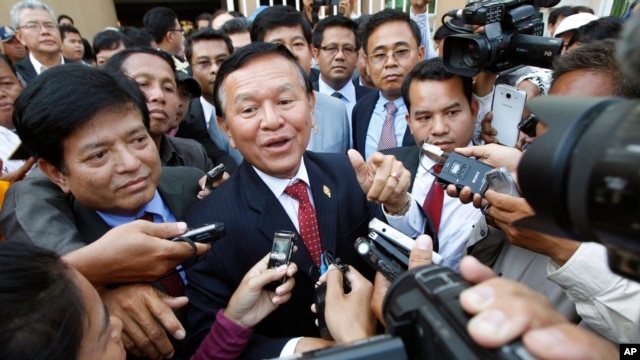News Analysis: Cambodia's political tension rises as opposition deputy leader removed as vice president
Xinhua | 31 October 2015
PHNOM PENH -- Cambodia's political dispute has
heated up after the ruling party lawmakers removed opposition Cambodia
National Rescue Party (CNRP) deputy leader Kem Sokha as the first vice
president of the National Assembly on Friday during a vote.
All 68 lawmakers from the ruling Cambodian People's Party (CPP),
including Prime Minister Hun Sen, voted to remove Sokha from his post in
the National Assembly, as all 55 CNRP lawmakers boycotted the session.
The parliament has 123 lawmakers in total.
"In accordance with the result of the vote to remove His Excellency
Kem Sokha from the first vice president of the National Assembly, I'd
like to announce solemnly that His Excellency Kem Sokha is successfully
removed from his position as first vice president of the National
Assembly," National Assembly President Heng Samrin said after the
confidential vote.
He said the vote to remove Sokha was made at the request of the 63 lawmakers.
Meanwhile, CNRP issued a statement, saying that the stripping of
Sokha's legislative post was made in violation of the Constitution and
the political agreement forged between the CPP and the CNRP on July 22,
2014.
"The Constitution does not state any provisions relating to the adoption of motion or removal of positions or functions of the president or vice presidents of the National Assembly," the statement said.
"The CNRP's 55 lawmakers can't attend the National Assembly's session
as it has violated the Constitution as the supreme law and the
political agreement between the two parties representing in the National
Assembly," it said.
But, CPP's senior lawmaker Cheam Yeap defended the removal of Sokha
as being in accordance with the Constitution after the parliament had
received petitions, proposed by approximately 300,000 people across the
country, to remove him from his position.
"The removal of Kem Sokha is made in line with the Constitution's
Article 35 that states that all requests from citizens shall be
thoroughly considered and resolved by the National Assembly," he said.
He said Sokha was not suitable to be the first vice president of the
National Assembly because he has incited social unrest and defamed the
ruling CPP's leaders.
Sokha became the parliament's first vice president after the CPP and
the CNRP struck the political truce in July 2014. Under the deal, the
CNRP ended its 10-month long boycott of the parliament following the
disputed 2013 elections, in exchange for parliamentary power sharing and
electoral reform.
CPP's senior lawmaker Chheang Vun said under the agreement, the position of the first vice president belongs to the CNRP.
"After the removal of Kem Sokha, the National Assembly is waiting for
the CNRP to propose its new candidate for this position," he said.
The dismissal came just four days after thousands of CPP supporters
staged a protest outside the parliament to call for Sokha to resign as
the parliament's first vice president. An hour after the end of the
protest on Monday, two CNRP lawmakers were dragged from their cars while
leaving the parliament and were badly beaten.
Chheang Vannarith, chairman of the Cambodian Institute for Strategic
Studies, said Cambodia was on the verge of political crisis as the
culture of dialogue between the two parties was dead and the culture of
fear has reemerged.
"Political tension between the two main political parties is going to
increase, and political polarization is rising which in turn leads to
political and social instability," he told Xinhua.



No comments:
Post a Comment